- Home
- Phyllis Ann Karr
The Gallows in the Greenwood
The Gallows in the Greenwood Read online
Table of Contents
Copyright Information
Author’s Introduction
Chapter 1
Chapter 2
Chapter 3
Chapter 4
Chapter 5
Chapter 6
Chapter 7
Chapter 8
Chapter 9
Epilogue
Short Bibliography
Glossary
Afterword
Alternate Afterword (Spring 2001)
COPYRIGHT INFORMATION
Copyright ©2002 by Phyllis Ann Karr
Published by Wildside Press LLC.
www.wildsidebooks.com
AUTHOR’S INTRODUCTION
This is a “What If?” story.
The Encyclopaedia Britannica, 11th ed., article on “Women,” records that in one case in the 1600s, a woman—a countess—personally exercised the office of Sheriff of Westmorland, hereditary in her family.
As soon as I read that, I started wondering: What if such a situation had applied in Nottingham in the days of Robin Hood ... which were not necessarily those of Richard the Lionheart—that specious idée fixe is perhaps our longest-lingering and most pervasive legacy from the 19th-century craze for Sir Walter Scott’s Ivanhoe.
CHAPTER 1
THE SQUIRE
Denis FitzMaurice was midway through Sherwood forest when the trap sprang, and suddenly he found himself dangling upside-down above the brambles to one side of the path.
At first he was confused, then irked, but not seriously alarmed. The outlaws—no one else would have placed such a trap on the public path—had committed some of their robberies but none of their murders on Sundays and saints’ days, and whatever the day not even the outlaws were likely to harm an envoy on a peaceable mission. He had traversed the forest from Nottingham castle to Kirkly convent unmolested, without even a riding animal to tempt them ... and thanks be to God and Our Lady that no mount had set a hoof in the noose—or would the greater weight have simply snapped the rope? The way back ought to have been doubly safe, the lady prioress’ safeconduct (a badge of white cloth which had been touched to the Holy Sepulchre) added to the lady sheriff’s wreath of white roses—presently bobbing on the path—and white veil that he was proud to wear knotted loosely round his right sleeve. In further token of peace, he carried no weapon save the indispensable little knife that served all purposes from cutting cooked meat to manicuring fingernails.
Besides, he had prudently brought no more silver money than the sheriff’s three marks—which had remained safe at Kirkly along with his own gift of six wax candles—so that all the money he had in his purse was five copper pennies and a few farthings.
As the roses of his wreath settled, however, it began to appear that the outlaws, having set their trap, might have gone elsewhere rather than sitting to watch it. Evidently Robin Hood himself, for all that his so-called “merry men” were in a certain sense volunteers, was plagued by the same laziness and laxity among the ranks that so often foiled the lady sheriff’s best-laid plans. Denis made himself shrug, strange though the gesture felt in his present position.
Meanwhile, with Mother Earth beyond his reach, the strain reaching down from his left ankle into his leg, loins, joints, middle, chest, and neck was growing more or less intolerable. Most of his body, indeed, seemed to be in active pain, with the possible exceptions of his arms, which were starting to go to sleep; his head, which seemed to be growing somewhat giddy— perhaps with his slow turning on the rope; and his loose right leg, which he did not quite know what to do with as it seemed to throw the rest of him out of the perpendicular.
Swinging forward, he climbed up his own left leg. The effort stretched his muscles still further, sending sharp pangs through limb and back. Worse, the rope slip-noose responded by tightening until it became obvious that he would have very little chance to release his ankle with the work of his fingers alone. Lowering his body as tenderly as he could, he got out his knife, which the guard-strap had held in its sheath, and once again began the awkward climb.
Some doubt crossed his mind as to the landing he might make after cutting the rope. But he was twenty years old, sound of limb and shapely of form, and though lacking in funds for horse and armor of his own, he had enjoyed reasonable success in practice gear on the training field.
Hauling himself the necessary last few inches up, he had just touched his knife to the rope when someone shouted “Ha!” behind him and an arrow whizzed past the noose above his ankle. He recognized it for an arrow when it plunked into a tree on the other side.
“Down, lad!” the voice went on.
It was a husky voice of medium pitch and at first he did not obey it. He did not feel inclined to take orders from an outlaw, and moreover, despite the arrow, the words might have been directed at a hound, of which the outlaws were said to keep at least one pack, half wild and answering to few even of the merry men. Again he raised his knife over the rope.
Then another arrow buzzed, this time passing so near his head as to stir some hairs before disappearing into the forest beyond. This, together with a repetition of the command, “Down, I say!” decided him to prudence for the time being, and he fell back into the at-length position, rather more jerkily than he would have preferred. Thus it came about that in the initial glimpse, caught when the motion of his body on the rope settled to a slow swing, he beheld his presumed entrapper upside down.
As nearly as he could judge from this unaccustomed angle, the outlaw was a fellow of about his own age, perhaps a year or two younger, with dirty clothes of coarse green cloth, dirty face, dirtier hands, and stringy brown hair cropped none too evenly at about shoulder length.The cleanest things about him were his stout yew bow and the third arrow, ready nocked. No hound was in sight.
“Are you attempting to shoot me down,” Denis inquired, “or merely using my body for target practice?”
“If I wanted to do either one,” said the husky-voiced outlaw, “I’d have done it with my first arrow. Drop your knife.”
Denis held it tight. Such ballads and other popular reports as he had overheard in the outlaws’ praise stressed their admiration of equal boldness to their own. “Cut me down,” he offered, “and let us try each other in fair fight, hand to hand.”
The outlaw pondered, unnocking his arrow and stroking his chin meditatively with the feather. “What weapons? Do you shoot?”
“Indifferently.” For a squire, Denis FitzMaurice was less than proficient in the fine art of boasting. “Are you adept at swordplay?”
“No. Robin and Scarlet and Will Stutely are. Besides, I don’t have a sword.”
“Neither do I, not on my person. Does it count for nothing —”
“Quarterstaves?” the outlaw asked, interrupting him. “I could cut us quarterstaves soon enough.”
If the bow was primarily the yeoman’s weapon, the quarterstaff was primarily the peasant’s. “I have never held one in my hands. What of knives? You carry a hunting knife, I think. Or, if you will, my knife against that little hatchet I see at your waist.”
The outlaw prodded his own chin several times with the nock of his arrow before shaking his head. “No, I think not. One of us is too likely to be hurt.”
The squire’s mouth might have fallen momentarily agape had the position of his head not preserved his manners by drawing his lower jaw downward toward his upper. “In that case,” he asked after a moment, “does it count for nothing that I am an unarmed envoy on a peaceable errand?”
“What errand?”
“I carry letters between my lady the sheriff and her grace the prioress of Kirkly.”
“What kind of letters?” the outlaw asked instan
tly, as if scenting plots.
“Letters of a personal nature, which I have not read. The two ladies are cousins and may well find much to communicate one with the other that touches you and I not at all.”
“Only letters?” said the outlaw, still suspicious. “No silver?”
The sheriff’s marks were safe at Kirkly, so it should do no harm to answer. “My lady the sheriff sent a stipend for Masses for the soul of her husband, and her cousin the prioress returns a small rosary, a gift of spiritual and sentimental value.” He judged that honesty did not require him to add that the rosary was carved of olivewood from the Holy Land.
“It was probably a large donation,” said the outlaw. “Churchmen wax fat on your donations.”
“Churchwomen,” Denis pointed out. “In this case.”
“Oh, most of it will go to the old priest who sings the Masses.”
“Much of it, no doubt. But if churchmen wax fat, at least it is on donations given freely, not extorted by force.”
By now the rope had found its natural twist and Denis, having exerted only his mouth for some moments, hung without turning. The outlaw came closer, stood just beyond reach, and craned his head sideways to study his captive. “So you are one of Madame Sheriff’s men,” he said. “We weren’t sure, when you went through this morning, but Much and John thought they’d seen you there at yon golden arrow contest.”
The metaphor of the sinking heart had not been made with upside-down bodies in mind, but Denis began seriously to despair that Robin Hood’s ruffians were going to respect his status as envoy. “I suppose I ought to thank you for permitting me to fulfill the first part of my mission. It was less than worldly wise of you.”
“Maybe,” said the outlaw.
“We might lay aside all weapons and wrestle for the mastery.”
The outlaw craned his neck still farther, bending his body until one foot seemed about to leave the earth. For all his efforts, his head remained in much the same parallel relation with the earth as that of a person sleeping sans pillow, but it nonetheless allowed them a somewhat better scrutiny of one another’s countenances. The outlaw had large eyes of a bright hazel hue, and features that appeared regular beneath the dirt. The small chin was almost piquant in its shape, the brows contracted in a frown of earnest consideration.
“No, I think not,” he decided at last, standing upright again to shake his head. “You’re bigger than I am. You might win, and I’d lose my first prize.”
Denis sighed and, still keeping hold of his knife, fumbled one-handed at his purse strings until the small velvet bag parted company with his belt and plummeted, nearly empty though it was, past his head to the ground. He felt annoyed—he had meant to toss it down as a thing of little worth. The rosary, by good fortune, was safe in its own little bag beneath his belt.
“Is this all?” said the outlaw. “How much do you have in your boots?”
“Not a farthing.” He noticed that in stooping to gather up purse and coins, the outlaw had brought his head within arm’s reach.
“I don’t believe you!”
“Sooner than speak an untruth, I would say nothing. Moreover, even small coins are highly uncomfortable when carried in the boots. But in order to see for yourself,” he went on with belated craftiness, “you shall have to take me down.”
The outlaw glanced up, saw that he was within reach of his captive’s knife, scrabbled a hasty retreat, and stood again at a safe distance, gazing at the squire’s boots as though to verify that they were indeed well out of reach. “You’re dressed too fine to have nothing but four pennies and three farthings on you.”
“One does not wear one’s worst attire when going to visit a lady prioress. And I had five pennies.”
Cupping them in one palm, the outlaw stirred them with two fingers of his other hand. “Four pennies. Four pennies and three farthings.”
“Then one penny must have fallen out. You will probably find it if you search the bushes beneath me.”
The outlaw shook his head. “You missed your chance, sheriff’s man. You won’t trick me into reach of your knife again.”
“Then take me down and let me search. I know there were five pennies: it is my own money. I would never have given up my lady the sheriff’s so easily.”
“Well, drop your knife and the prioress’ message.”
“My knife—perhaps. The lady prioress’ message—no.”
“If I have to go get Much and John and the others, we’ll search you and get her message anyway.”
He strapped his knife back into its sheath, folded his arms across his chest, and said nothing.
“If it’s only gossip and cousinly chatter, why should you mind? We’ll give it back.”
“Can you read?”
“No, but Marian and Robin and Scarlet can. And our friar, or so he says. And Alan a Dale can, a little. They’ll send it on to your sheriff. If it really is harmless gossip and nothing more.”
“I believe that it may contain private spiritual counsel. I would not give it into your hands even if you yourself could read and swore to return it at once. Besides, it is on tablets. Not even Robin Hood can easily wrap tablets around an arrow like parchment and shoot it back to civilized people.”
“As you like. Be sure we’ll get it anyway, sooner or later.” The outlaw made a shrug that now looked as curious to Denis as his own had felt. Staring past the outlaw’s head, he caught his breath. A bright crimson flame was darting out from a tree on the far side of the path. “Fire!” he cried. “Fire in Sherwood forest!”
The outlaw turned and stared as the flame licked up the first tree’s trunk, laced through its limbs to turn its dancing green leaves orange and gold, and spread to several surrounding trees. He turned back, frowned, and said, “That was a stupid trick, sheriff’s man.”
Then Denis understood that the flames were visionary. He might be going mad from the stagnation of blood in his brain, but sooner than admit this he said, “Yes, a very stupid trick,” and did not even understand till long afterward how close that had come to being an untruth.
“Well, drop your knife, anyway,” said the outlaw.
“Why?” said Denis, blinking at the flames, which were adding green and violet to their other hues.
“I can’t get you down by myself. Not unless I shoot through the rope, and then you might break an arm or fall on your pretty head. I’ve got to go find Much and John. And my arrow, that went off into the woods over there. I can’t leave you here with your knife to try cutting yourself down again.”
“Blow your horn. Summon them here with your horn and let me fight them all.” Shaking his head to clear it of the flames, he drew and began to brandish his knife.
“I don’t have a horn. I’m only Midge the miller’s brat. Now drop it, there’s a good fellow.” Midge put out his longbow and gave Denis a prod on the right shoulder that set him spinning round again.
“I’m sorry you’re only a midge,” he mumbled, gradually slowing. Added to everything else, now there were a growing ache in his head and a queasy, seasick feeling throughout his middle. He sensed that the sooner he was taken down, the better ... and it might have been so much sooner if Midge had had a horn to summon help. He decided to drop the knife.
“That’s better,” Midge said cheerfully, venturing over to retrieve it from the bushes. “I think I’d better tie your hands, too.”
“I will give you my word not to use them for escape,” he said, feeling it was a cheap enough promise since he could probably do very little without his knife.
“Well...” Midge shook his head. “No. You might have another knife in your boot or somewhere. I can’t take any chance.”
As Midge rolled a length of log over from the edge of the path and stood it on end beneath him, Denis pronounced, with noble efforts not to babble, “I have been my lady the sheriff’s man since she was mistress of fair Barnesdale manor and I her loyal page. I am proud to be squire to our gracious lady the sheriff of Nottingham.
As my lady’s most faithful retainer, I always keep my given word...”
“That’s very fine, but I’m outlaw and peasant. You noble knights and squires don’t have a very good name for keeping your word to such as us. And it’s up to me to make sure you don’t get away, so I can’t take any chance, now can I?” Unslinging some rope from around his chest where he had worn it baldric-like, Midge climbed up on the log and turned Denis for a view of his back. “Now then, up with your arms, my lord.”
For a few atoms of time he considered thrashing back to knock the outlaw off the log. The same inconvenient impulse that earlier had saved Midge’s head from his knife now saved Midge’s person from a tumble off the log. Rationalizing that the sooner all this was done with the sooner he would be down, he allowed Midge to haul his arms into place behind him.
The trap, he observed, had been made with a sapling that, however necessarily lithe, must have bent grudgingly into place, being thick enough to support a man’s weight without danger of snapping. “If you cannot take me down without assistance,” he observed, “you cannot have set this trap without assistance.”
“Much and John helped me, of course. Our Little John is stronger than Gog and Magog. He’ll have you down right soon, once I find him.”
“Find him quickly. Then I am not your prisoner exclusively. Not your private first prize.”
“And wouldn’t I have been for it from them if you got away because I was careless.” Midge’s fingers had not faltered in their work, but when it seemed to be done, for a quarter-ounce of time, he thought he felt a soft pressure on his right hand between wrist and thumb, like a half-gesture of friendship, even tenderness. No doubt only a delusional pulse of the dammed and protesting blood. He began to clench and unclench his fist.
Midge jumped lightly off the log, kicked it away, looked him in the eye again, and gave something between a laugh and a gasp. “If you could see how red you are in the face!”
There ought to have been some witty rejoinder, but on the spur of the moment he could not find it. Crimson and purple flames were leaping from the various surrounding trees again. He closed his eyes and tried to dangle with as much dignity as possible.

 The Gallows in the Greenwood
The Gallows in the Greenwood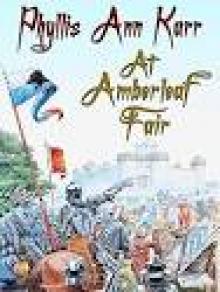 At Amberleaf Fair
At Amberleaf Fair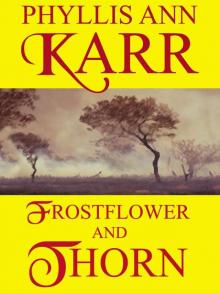 Frostflower and Thorn
Frostflower and Thorn The Fanciers & Realizers MEGAPACK
The Fanciers & Realizers MEGAPACK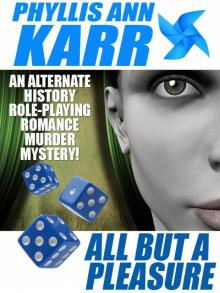 All But a Pleasure
All But a Pleasure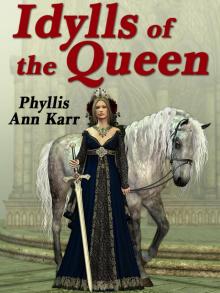 The Idylls of the Queen
The Idylls of the Queen Frostflower and Windbourne (Frostflower & Thorn)
Frostflower and Windbourne (Frostflower & Thorn)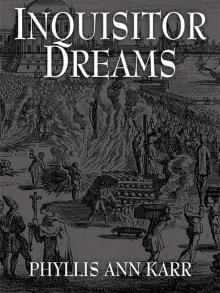 Inquisitor Dreams
Inquisitor Dreams